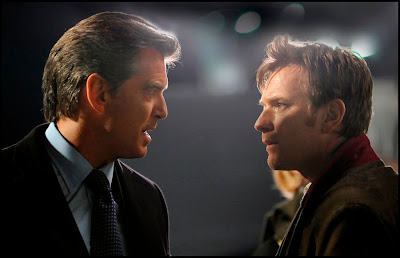Le nuit américaine (Day for Night), 1973Dir: François Truffaut
An extremely important film for really understanding Truffaut, if not necessarily (in my opinion) his best. In a tradition of films about film making and the people who are involved in that,
Day for Night can certainly hold its own against many pretenders. It especially shows the difference between Truffaut and his former friend and colleague, Comrade Dickhead (aka J-L Godard). Even in the early 60s, Godard was already rebelling against a system that had made him famous and made a film
, Contempt (1963), about the capitalist aspects of making a movie and all the nonsense that is involved with that. That film is about other things as well though, which is why it is one of his better films. Truffuat, however, is interested in other things. The main question the movie is asking is, "Are movies more important than life?" It seems like a silly question with an obvious answer, but for Truffaut, whose obsession ran deep, it was serious. It correlates back to his early soundbite, "I have always preferred this reflection of life than to life itself."
 Day for Night
Day for Night is about the filming of a really bad film, "Meet Pamela," but in essence is about the people involved and how silly it makes them. Tons of things go wrong on the set (drunk actresses, sexual indiscretions, stubborn animal actors, the death of one of the actors), but in the end it's about that these people would not want to be doing anything else. Truffaut plays himself as Ferrara the director, or a slightly silly version not dissimilar to Fritz Lang's director in
Contempt. His reoccurring nightmare, one of those dark touches that Truffaut places into his films, of the little boy walking with a cane, turns out to be something far more interesting than any kind of Hitchcock allusion that it could have been. The little boy ends up stealing
Citizen Kane (1941) stills from the local cinema, maybe the most personal gesture Truffaut has put into any of the films of his that I have seen. It kind of reminded me of the way kids snag band fliers and poster at shows, sort of sweet and pathetic at the same time. The way that you see Truffaut working with the actors seems to be the exact way he would even if he were not being filmed, never demonstrative and always hands on. Even at one of the darkest moments for the production, after J-P Leaud drops the bombshell on
Jaqueline Bisset's (I'd say one of the hotter English actresses ever) husband about their tryst, Truffaut's character, so Truffaut himself, makes something cinematic out of something that is very real. Trying to comfort Bisset in her dressing room, she opens up to him about her feelings of where her life is and how films affect it (she basically wants to quit the biz after her mistake). Truffaut listens patiently to her and then gets her to come around to finish the film. He then changes the dialogue for her character in an important scene to exactly what she said, word for word. So what is more real now? Cinema can teach us lessons that have a greater impact than what we encounter in real life, can it not?

The rest of the crew and actors are just as silly, getting themselves into trouble and obsessing over film, you know, just regular shit that happens on a movie set. It took me a while to get really into the film, once the film and the "non-film" started to blend, but at that point this is great. J-P Leaud is probably the silliest of the lot, playing a version of himself that is huge crybaby and self-involved man child. He goes around telling everyone that he is getting married to the script girl (French pop star,
Dani), even going far enough to ask Truffaut to be his best man at the wedding. This is news to her though. After she dumps him for a stunt man, he goes around asking people, "Are women magic?" He gets his best answer from the famed aging actor and "lothario," Alexandre (Jean-Pierre Aumont), who it turns out is actually gay. The film really does a great job of bringing out Truffaut's humor, which isn't exactly a bunch of knee slappers but gives you a whole lot to smile about. It all comes back to movies though, and their impact on people. When Joelle (
Nathalie Baye, a huge crush, I must admit), personal assistant to the director, hears about Dani's escape with the stunt man, she say "I'd drop a guy for a film, but I'd never drop a film for a guy." That, in a nutshell, is what the film is all about. Even with all the stuff that happens, they all still want to make movies. And at the end, the prop man says, "Well, I guess it's back to unemployment." Sounds right.
(RIP Movie posters. I'm not even sure why I started with you...I just don't care enough anymore.)
4/5



































